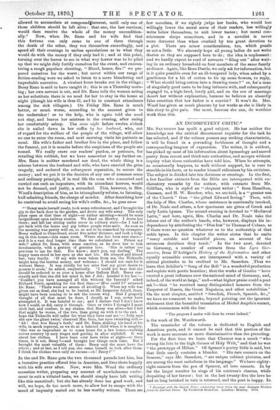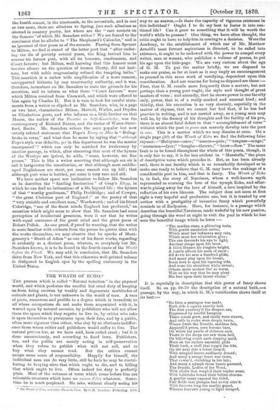AN INCOMPETENT CRITIC.* MR. SAUNDERS has spoilt a good subject.
He has neither the knowledge nor the critical discernment requisite for the task he has selected, and if the volume possess any striking characteristic, it will be found in a pervading feebleness of thought and a corresponding languor of expression. The writer, it is evident, has picked up most of his information about hymnology and sacred poetry from recent and third-rate authorities, and accepts without inquiry what these authorities have told him. When he attempts, as occasionally happens, to walk without support, he is sure to stumble in his facts, or to render himself ridiculous by his criticism. The subject is divided into ten divisions or evenings. In the first, a few familiar extracts from the Bible are interspersed with ex- clamatory remarks by the author, with extracts from Mr. Gilfillan, who is styled an "eloquent writer ; " from Hamilton, Gaussen, and H. W. Beecher, who, we are told, is a "greater son of the Church" than "the gifted Edward Irving." Then, with the help of Mrs. Charles, whose assistance is continually invoked, of Dr. Neale and others, a few specimens are given of Greek and early Latin hymns. The second evening is devoted to "Mediaeval Latin," and here, again, Mrs. Charles and Dr. Neale take the labour out of the author's hands, who, however, displays his in- dependence by attributing the "Dies Ira" to Thomas of Celano, as if there were no question whatever as to the authorship of that noble hymn. In this chapter the writer states that be omits "many notable and beautiful pieces, on account of the erroneous doctrines they teach." In the two next, devoted to Germany, a number of extracts from the Lyra Ger- manica, from D'Aubigne's History of the Reformation and other equally accessible sources, are interspersed with a variety of critical platitudes to be credited to Mr. Saunders. .Thus we learn that Schiller's "Song of the Bell" is a wonderful production and replete with poetic beauties ; that the works of Goethe "have exerted a great influence over the national mind of Germany, and, indeed, of the world at large," and—what higher praise could a poet ask ?—that "he received many distinguished honours from the Emperor of Russia, the Great Napoleon, and other notabilities." On the next chapter, entitled "Swedish, French, Spanish, &c.," we have no comment to make, beyond pointing out the ignorant statement that the beautiful translation of Michel Angelo's sonnet, which commences with the line "The prayers I make will then be sweet indeed," is the work of Dr. Wordsworth.
The remainder of the volume is dedicated to English and American poets, and it cannot be said that this portion of the work is more accurate or more discriminative than the preceding.
For the first time we learn that Chaucer was a monk "who strung his lute to the high themes of Holy Writ," and that he was "the prototype of Milton." Of Spenser's poetry little is said, but that little surely contains a blunder. "His rare sonnets on the Seasons," says Mr. Saunders, "are unique cabinet pictures, and are among the most melodious in the language." We have eighty- eight sonnets from the pen of Spenser, all love sonnets. In by far the larger number he sings of his mistress's charms, while despairing of her favour ; but in the last twenty-five the love he had so long lavished in vain is returned, and the poet is happy. In
• Evenings with the Sacred Poets: containing Gems from the most Eminent Writers from the Earliest Times. By Frederick Saunders. London: Bentley. 1870. the fourth sonnet, in the nineteenth, in the seventieth, and in one or two more, there are allusions to Spring, just such allusions as .obonnd in amatory poetry, but where are the "rare sonnets on 'the Seasons "of which Mr. Saunders writes ? We are forced to the conclusion that he alludes to "The Shepheard's Calender," and is as ignorant of that poem as of the sonnets. Passing from Spenser to Milton, we find it stated of the latter poet that "after endur- ing the ills of poverty several years, the King invited him to resume his former post, with all its honours, emoluments, and 'Court favours; but Milton, well knowing that this honour must -involve silence on the question of human liberty, did not hesi- tate, but with noble magnanimity refused the tempting bribe." This assertion is a rather wide amplification of a mere rumour, unsupported hitherto by any trustworthy authority, and it was, 'therefore, incumbent on Mr. Saunders to state the grounds for his -assertion, and to inform us what those "Court favours" were which Milton received from Cromwell, and which were offered to him again by Charles II. But it is vain to look for careful state- -meats from a writer so slipshod as Mr. Saunders, who, in a page -or two later, characterizes Milton, Marvell, Waller, and Dryden -as Elizabethan poets, and who informs us a little further on that Mason, the author of the Treatise on Self-Knowledge, was the 'contemporary of Richard Baxter, and the rector of Water-Strat- ford, Bucks. Mr. Saunders echoes the once popular but now 'utterly refuted statement that Pope's Essay on Man is "Boling- broke in verse," and what does he mean by saying that "although Pope's style was didactic, yet in this department he was the master 'unsurpassed "? which can only be matched for irrelevancy by -another passage, in which, after observing that most of the hymns -of the Wesleys are lyrical, he adds, "some, however, are fine -poems." This is like a writer asserting that although sea air is salt it invigorates the constitution, or that although most middle- -aged Englishmen are stout, yet some cannot run up hill ; that -although port wine is bottled, yet some is very rare and old.
We have neither space nor inclination to follow Mr. Saunders -as he describes the "dazzling fascination" of Gray's Elegy, in -which he can find no intimations of a life beyond life ; the hymns of that "worthy gentleman," Philip Doddridge; and of Cowper, " the great Christian poet of England ;" or the poetty of that "very amiable and excellent man," Wordsworth ; and of his friend 'Coleridge, "one of the finest minds England has produced," an assertion which might seem to show that Mr. Saunders had some ,perception of intellectual greatness, were it not that he writes with equal assurance of the great mind and the great poem of Robert Pollok. As one proof, if proof be wanting, that the writer is more familiar with extracts from the poems he quotes than with the works themselves, we may observe that he speaks of Mont- .gomery's "Death of Adam" as one of his finest works, regarding it evidently as a distinct poem, whereas, as everybody but Mr. Saunders knows, it is to be found in the fourth canto of the IVorld Zefore the Flood. We may add, in conclusion, that Mr. Saunders Alates from New York, and that this otherwise well-printed volume as disfigured to English eyes by the spelling customary in the -United States.































 Previous page
Previous page